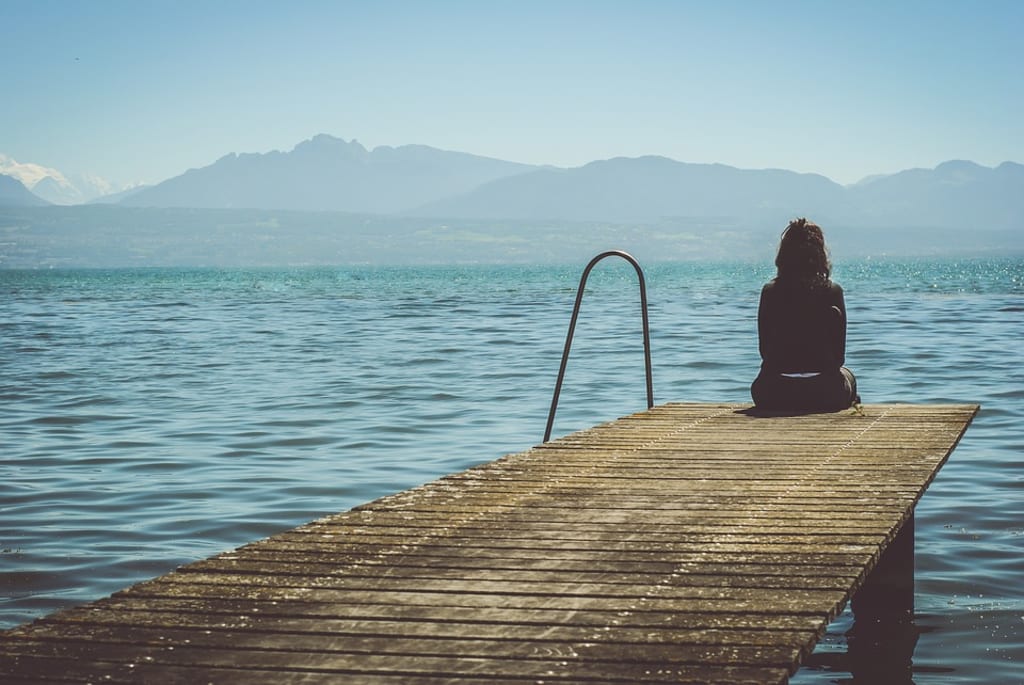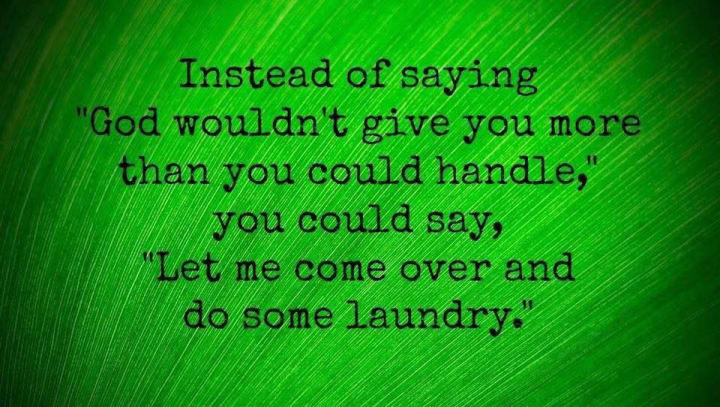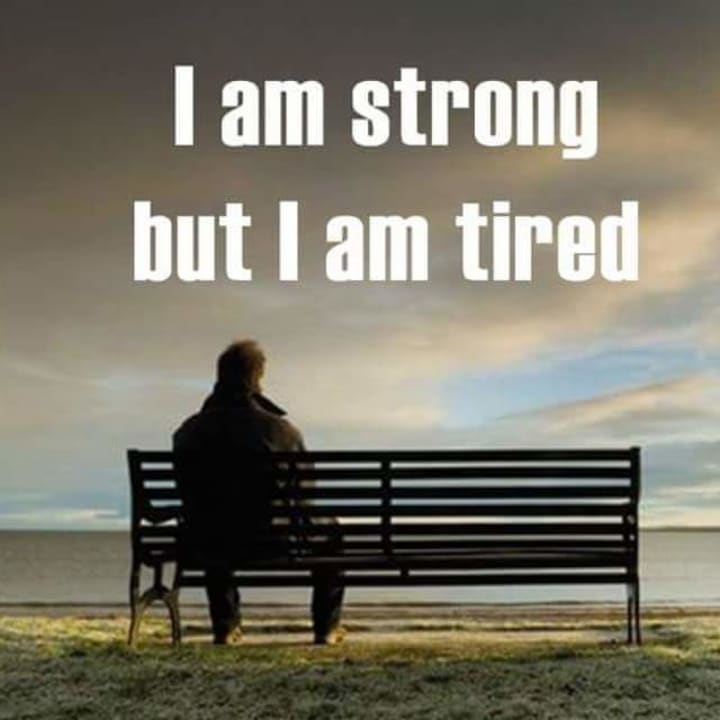Why Being Strong Is a Lie
The Brutal Truth About the Myth of Inner Strength — A Definitive Essay

I went to my doctor today and as part of my routine visit she asked me how I’m doing. I told her I’m really good at faking how well I’m coping, but that I’m getting tired, that I’m losing my fight, my resilience. That old saying, ‘that which doesn’t kill you makes you stronger’ is bullshit. It might at first, but after a while it starts to wear you down until eventually you wish it would.
“But, you’re doing so well. I don’t know how you manage it,” she replied, effectively cutting down any attempt I might have made in asking for help. After all, if my doctor thinks I’m doing okay, then I must be, right?
There may be no shame in asking for help, but unless you’ve been in the situation yourself you don’t know how damn hard it actually is to get help. Friends, family, neighbours offer to help but they all secretly hope you won’t take them up on the offer — heck, I’m the same, happy to help someone occasionally, but I don’t really want them to make a habit of it. And, trying to get help from social services/government departments, etc. involves so much hoop-jumping and humiliating interrogations and form-filling to prove your neediness that it is not worth the help you may receive if you are actually successful.
The problem with platitudes like ‘you’re so strong,’ ‘you have the strength to get through this,’ ‘God doesn’t give us more than we can cope with,’ is that they are a cop out. They give the speaker freedom of responsibility or any obligation they might feel to get involved. If you fool yourself into thinking a person in crisis is strong enough to cope on their own, then you get to clear your conscience for not helping. If you really do give a damn about the person you’re ‘giving encouragement’ to, you should be saying ‘what can I do to help you cope?’ instead of saying ‘you’re doing great’ and leaving the person alone to fend for themselves.

While some people seem to be able to sail through life with few challenges or tragedies, my life is one of those that is a never-ending barrage of life challenges and health issues. I won’t go into all the stresses, disappointments, broken-hearts, grief and struggles I’ve faced over the years, as compared to my health issues, those were the easier things I’ve had to deal with.
I have multiple conditions that are getting more and more difficult to cope with as I get older. At one time, I thought my poor vision was my biggest issue, but then I learned I had a brain deformity that required brain surgery to prevent further deterioration. Then came the diagnosis of a connective tissue condition that affects every system, particularly my joints. And as if that wasn’t bad enough, the past three years I’ve been battling a hyper-allergy condition that is getting increasingly harder to control. It’s like trying to fight the Borg — every time I try a new treatment it improves for a bit, but then goes out of control again and I have to move on to something stronger, over and over.
I live my life with poor vision, intense headaches, brain fog, neurological issues, balance and coordination problems, the occasional seizure, daily muscle and joint aches and pains, chronic fatigue, a severe eczema on my hands that causes my fingers to swell, continual blistering, and hundreds of tiny wounds covering the palms and fingers that don’t heal, making anything I do with my hands incredibly painful, plus insane reactions to heat where I come out in angry red hives all over my body. I’m 43 and in bed at night before most children so I can get my minimum 10 hours sleep needed and still often nap in the afternoon, sometimes up to fours hours.
I face my struggles alone. I have no partner and no near family other than my aging mother who lives on the other side to the country. When I have to make an urgent visit to my doctor or emergency room, I go alone and have no one to bring me home. I have no one to help with the practical things like cooking a meal which can present a huge challenge to me as with my devastated hands I struggle to open containers of ingredients, hold implements, or chop vegetables. On the other hand living alone is probably a good thing because crying out aloud in pain when I go through the excruciating ordeal of taking a shower helps me cope.
The other thing with living alone is that no one actually gets to witness my suffering. So, like the old conundrum ‘if a tree falls in a forest and no one is there to hear it, does it make a sound,’ if one struggles to cope and no one is there to see it, how do you prove that you're actually struggling?
Of course, I have friends and I know I can turn to them, but the reality is they have their own problems and their own families needing their support. A friend in need may be all very well, but a friend who is always in need is a nuisance, an energy drain, a person who ‘brings others down.’ I don’t want to be that to my friends. I want my friends to be my friends, not my caregivers. When I see them, I want to enjoy our time together without burdening them with my problems.
There are other reasons why I don’t tend to turn to my friends.
1. I get drawn into a pity contest which I always graciously lose on purpose to avoid an argument.
“How are you?” my friend asks.
“Good,” I reply. “Though I’ve got a bit of a headache..." [I downplay the reality that my head feels like it is in a vice that is getting steadily tighter and tighter]. And immediately it starts…
“Oh me too, I know exactly how you feel. I’ve had to take paracetamol for two days in a row and I never take painkillers unless I really have to.”
Are you freaking kidding me?! I think to myself in my drug-induced haze, after my fifth consecutive day of three times daily, double doses of codeine that has done diddly-squat to loosen the vice on my head. I say nothing — it would take too much energy anyway, so I sit and listen, providing a sympathetic ear while my friend goes on and on about her ‘bad’ headache. I know her feelings are valid and I shouldn’t diminish her experience, but seriously, she does not know exactly how I feel, she has no damn idea.
2. I get the “you’re so lucky that you’re so strong” comment, as if strength is some kind of magical gift that one is born with, and that if they tell me all their problems maybe they’ll somehow absorb some of my mystical strength.
I’m no different than anyone else. I’m not strong, I’m selfish. I have to be selfish to summon up the strength to look after myself. Being strong takes a phenomenal amount of effort and self-discipline. Building strength is no different to the effort and self-discipline it takes to stick to a diet or maintain an exercise program. If I can do it, then so can everyone else, so I have little patience for people who whine about their situation when they are fully capable of changing it.
3. I get the twenty questions session. I’m sore, tired and just want to enjoy my friend’s company, but they bombard me with incessant questions about my condition and whether I’ve considered various nonsense treatments. This usually results in me snapping at them saying I don’t want to talk about it, and they get hurt for ‘trying to help.’
4. I get undone by the friend who lets me let my guard down. There’s the friend that I see two or three times a year, who is caring and supportive, doesn’t interrogate or invalidate me, who listens and stays with me in companionable soothing silence, whose own strength gives me strength and allows me to let go of it all for a while.
The trouble is, once he leaves, it causes a flood of bottled-up emotions to come out and I’m left feeling weak and vulnerable for days after until I close off those feelings again to regain control, to regain my ‘strength.’

Because I don’t have a ‘support person(s)’, I have to rely on myself to find ‘strength.’ I put strength in quotes, because strength is a misnomer. Strength is an illusion, a façade, an act. I don’t appear strong because I am strong; I appear strong because I am skilled at creating the illusion of strength.
So how do I create the illusion of strength? This is where the brutal truth comes in. Creating strength requires sacrifice and in my case, isolation.
1. I avoid people. I should get out more; having a social life would be good, however, I am an introvert which means I recharge by being alone. Being around people drains me of energy — energy I can’t afford to waste. No matter how enjoyable, catching up with friends always leaves me exhausted afterwards so I can’t do it too often.
2. I stay out of other peoples’ issues. I’m an empath and as much as that makes me the best person for people to share their problems with, it damages my own wellbeing, taking on their issues and emotions, so it’s better for me to keep my distance.
3. I don’t allow myself to cry. Crying drains me of energy, always leads to a migraine and leaves me feeling spent and weak. It takes a huge effort to get myself together again afterwards that it’s just not worth the indulgence.
4. I avoid talking about myself; I always steer the conversation away from me. If I have to talk about how I’m doing, I lie because no one really wants to hear the truth.
5. I make myself believe that love is something that happens to other people. Though I’m told I’m attractive, my health issues mean I can’t keep up with the demands of a normal relationship. I can’t even enjoy intimacy without pain. So I tell myself love is not my destiny.
If I did find someone that I could be vulnerable with, someone I could lean on, I know that I would end up relying on them more and more. I would become a burden and that would be unfair and only lead to resentment. And in my fragile state I couldn’t survive another broken heart, so I tell myself I’m better off alone.
6. I’ve given up on hope. “I hope you get better soon,” say my friends. The truth is, I may find better treatments, get improved control over my conditions, but I’ll never get better. In fact, there is all likelihood that my deteriorating health will cut my life short, so I’m not wasting time on hope. The only life I have is the life I have right now. If you put too much faith in hope you allow life to pass you by in the meantime.
7. I remind myself that things can always be worse and stay thankful for what I do have and how lucky I am to have the life I do, which, despite the struggles, is actually pretty much all I ever dreamed of — living in the country, working from home, and being an artist and writer.
8. I live in my head. I imagine, I daydream, I walk in nature and lose myself in the greatness that is life itself. I tell myself that I am not my body, that it is just a vessel I am tethered to, and that one day I will be set free, like the real me is the air inside a balloon tied to the wrist of my body and one day the string will come undone and I will float up into the sky higher and higher until I re-join the universe where I belong.
Yes, I am strong but the price is high. I’d trade my strength in a instant for the chance of being loved, for the freedom to be vulnerable, to cry sometimes, to have the energy to spend on living life as it should be lived, instead of spending that energy on fighting so hard just to make it through the day. Believe me, being strong like me is not a gift, it is a curse.
About the Creator
Skye Bothma
Skye is a freelance editor and writer living in rural New Zealand, where she writes about life, love and what it is to be human. She is also the author of one novel and working on her next book. Visit her website at www.skyebothma.nz






Comments
There are no comments for this story
Be the first to respond and start the conversation.